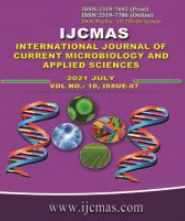


 National Academy of Agricultural Sciences (NAAS)
National Academy of Agricultural Sciences (NAAS)

|
PRINT ISSN : 2319-7692
Online ISSN : 2319-7706 Issues : 12 per year Publisher : Excellent Publishers Email : editorijcmas@gmail.com / submit@ijcmas.com Editor-in-chief: Dr.M.Prakash Index Copernicus ICV 2018: 95.39 NAAS RATING 2020: 5.38 |
Cucurbitaceae is a large group of summer vegetable crops, which includes 118 genera and 825 species. India is the second largest producer of vegetables in the world with 2.8 % of total cropped area and 13.38 % of total vegetable production. Cucurbit is the one of the largest cash crops produced in India. These vegetables contain rich protein, carbohydrates and water to the extent of 90%. Being a rich nutritious vegetable, the seeds of cucurbitaceae may contain the seed borne fungi whichwere isolated using the standard blotter method, deep-freeze method and molecular method. A wide range of pathogens affect the productivity of cucurbits. Wilt and rot are the major soil borne fungal diseases caused by Fusarium spp., damping-off by Phytophthora spp., Acremonium spp. and Pythium spp. resulting up to 70% yield loss. The moisture content of the seed, storage period, prevailing temperature and degree of seed invasion influence the development of seed-borne fungi. The pathogen may be present externally or internally or associated with the seed as contaminant. The environmental conditions support the pathogen dominance on to crop. Germination failure of seeds is mainly due to temperature, gas exchange, water activity as well as growth hormones involved in regulating germination. Biotic and abiotic factors clarify that loss of germination capacity is the final manifestation of seed deterioration.
 |
 |
 |
 |
 |